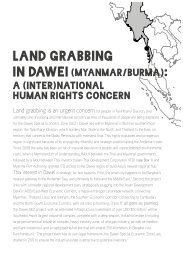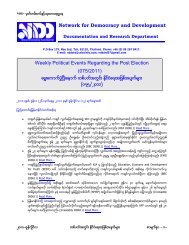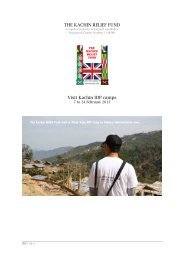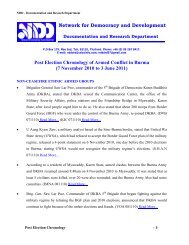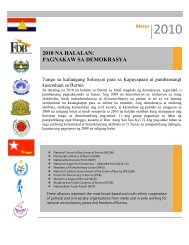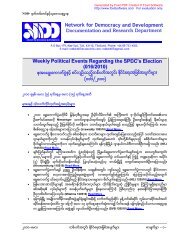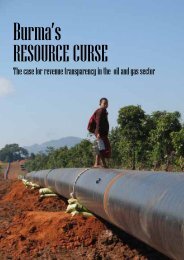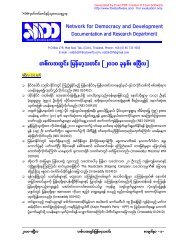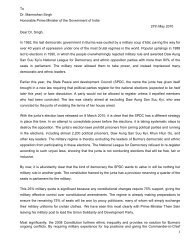Cyclone Giri - Two Years On - Burma Action Ireland
Cyclone Giri - Two Years On - Burma Action Ireland
Cyclone Giri - Two Years On - Burma Action Ireland
You also want an ePaper? Increase the reach of your titles
YUMPU automatically turns print PDFs into web optimized ePapers that Google loves.
<strong>Cyclone</strong> <strong>Giri</strong>: <strong>Two</strong> <strong>Years</strong> <strong>On</strong><br />
EXECUTIVE SUMMARY<br />
<strong>On</strong> 22 October 2010, a category four cyclone name <strong>Giri</strong>, hit Arakan State and made its way along the<br />
west coast of <strong>Burma</strong>. <strong>Cyclone</strong> <strong>Giri</strong> was the worst natural disaster <strong>Burma</strong> suffered since <strong>Cyclone</strong> Nargis,<br />
and came along a little more than two years after Nargis left some 140,000 dead and impacted the lives<br />
of at least 3.4 million people. Mraybon, Pauktaw, Kyaukphru, and Marmbra townships were the worst<br />
hit by <strong>Giri</strong>, while Manaung, Rambray and Ann townships were also severely affected by winds of between<br />
120-160 mph. The impact of <strong>Giri</strong> left at least 259 people dead, and affected approximately 1 million<br />
people by causing catastrophic damage to homes, agriculture, fisheries and infrastructure in a community<br />
that is still struggling to recover from the previous <strong>Cyclone</strong>.<br />
Disaster struck Arakan state just 16 days before the general election of 7 November 2010. The Junta’s<br />
response to cyclone <strong>Giri</strong> was characteristically marred by a failure to issue appropriate warnings,<br />
acknowledge the situation, or to even respond promptly. They prioritized the election over humanitarian<br />
needs, and interfered with and misappropriated humanitarian assistance provided by international and<br />
local NGOs. The government instructed the UN to keep the relief operation low profile and advised that<br />
increased international engagement was uncalled for despite the fact that the damage was high. At the<br />
international level there was no UN Flash Appeal for funding, and the Myanmar Red Cross Society told<br />
the International Federation of the Red Cross not to make an international appeal. The decisions to<br />
underplay the cyclone caused considerable funding delays, possibly leading to less funding overall.<br />
Concern and response to the <strong>Giri</strong> disaster, both inside and outside <strong>Burma</strong>, was fairly muted, certainly<br />
when compared to Nargis. Arakanese organisations did respond, but few other organisations within<br />
<strong>Burma</strong> did. And compared the widespread coverage of Nargis, <strong>Giri</strong> was largely ignored by the international<br />
media and unofficial media outlets in other states of <strong>Burma</strong>. Although Daw Aung San Suu Kyi spoke out<br />
against the response, and some appeals for the victims were launched, they were largely ignored by the<br />
media.<br />
The people of southern Arakan State are still suffering problems with rebuilding their livelihoods. After<br />
two years the infrastructure damage caused by the <strong>Giri</strong> has still not been fully repaired. In 2011 the<br />
vulnerable population was hit again by torrential rains and flooding, which killed people and destroyed<br />
tens of thousands of acres of farm land, all of which exacerbated damage left by <strong>Giri</strong>’s impact. The<br />
accumulative effect of both disasters has led to serious problems such as starvation and a general<br />
degradation of the health and education systems. As a consequence, hundreds of South Arakanese<br />
youths have been migrating, predominantly to Kachin State or Thailand, in search of job opportunities.<br />
However the jobs available are usually dangerous, the living conditions deplorable and few people take<br />
interest in their circumstances.<br />
Presently little is mentioned about the on-going humanitarian crisis two years after the initial impact of<br />
<strong>Giri</strong>, with almost all but those directly affected, forgetting or ignoring the aftermath. Of the INGOs that<br />
arrived and assisted victims in the wake of the cyclone few are left and even fewer are able to offer<br />
assistance to the local population who are still in need of food and shelter and living in deplorable<br />
conditions since 2010. South Arakan state falls within the international communities ‘food poverty’<br />
parameters, and whilst this warrants assistance the region remains ignored. This area is frequently forgotten:<br />
Between 2007-09 aprox. $350 million was spent in <strong>Burma</strong> by International NGOs, however Southern<br />
Arakan state was the only place in <strong>Burma</strong> where the total expenditure amounted to $0.<br />
An independent assessment of the response to <strong>Cyclone</strong> <strong>Giri</strong> has proven a considerable challenge. The<br />
evaluations given by international NGOs and UN Agencies, including the reports of the UN Office for<br />
the Coordination of Humanitarian Affairs (OCHA), were supervised by the military junta. Those<br />
evaluations differ significantly from those provided by survivors, local relief workers, and local NGO<br />
staff. The discrepancy relates to serious issues such as the death toll, relief supply efforts and the<br />
occurence of human rights abuses. It is from the accounts of those directly affected that have formed the<br />
1




